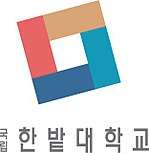Hanbat National University
Hanbat National University(HBNU) is a Korean university established in 1927. HBNU is located in Daejeon Metropolitan city with its population of 1.5million people and called city of science and technology and a hub of traffic in South Korea. Hanbat National University(HBNU) with spirits of "Sincerity", "Harmony", and "Creativity" is now showing excellence in Education and Research Development in its applied science and technology. Under the continuous collaboration with industries and research institutes and local communities, HBNU has been dedicated not only to cultivation of creative and innovative human resources for local communities, society and nation, but contributed to the advancement and prosperity of nation as well as region.
 | |
| Type | National(Public) |
|---|---|
| Established | May 20, 1927 |
| President | Choi, Byoung-Wook. Ph.D. |
| Students | 9,037 |
| Undergraduates | 8,486 |
| Postgraduates | 551 |
| Address | 125 Dongseodae-ro, Yuseong-Gu , , |
| Campus | Daejeon Campus (Yuseong), Daedeok Campus |
| Mascot | Eagle |
| Website | http://www.hanbat.ac.kr |
HBNU with the prestigious image of a representative institution in the field of university and industry collaboration in S. Korea has been chosen for a variety of nationwide-level projects such as An Autonomous Improvement University Project(only granted to the highly ranked universities in S. Korea), Leaders in INdustry-University Cooperation+(LINC+), The Project to Nurture Universities to Lead Start-ups, and well Management of Systematic Career System for students. Based on these achievements, HBNU is in the highly ranked position of job employment, scholarship for students, and investment of lots of funds to research and education. HBNU is well operating various special and customized projects for students and local residents as well.
HBNU consists of 6 colleges and 1 faculty: College of Engineering, College of Information Technology, College of Construction, Environment & Design, College of Humanities, College of Business and Economics, College of Life-long Education, Faculty of Basic Convergence Education.
Hanbat is now offering Bachelor, Master & Doctoral courses in the academic fields of colleges mentioned above and currently has more than 9,000 students.
In addition, more than 300 students are annually participating in various international programs. Also, over 300 international students are being enrolled and taking their courses in various majors on order to pursue their future goals at HBNU. HBNU always welcomes international students as well as domestic potential students at any time through cooperation with the partner universities and higher institution home and abroad.
Colleges
College of Engineering: 5 departments
- Department of Mechanical Engineering
- Department of Advanced Materials Engineering
- Department of Chemistry and Biological Engineering
- Department of Industrial Management Engineering
- Department of Building Services Engineering
College of Information Technology: 4 departments
- Department of Electrical Engineering
- Department of Electronics and Control Engineering
- Department of Computer Engineering
- Department of Information Communications Engineering
College of Construction, Environment and Design: 6 departments
- Department of Civil and Environmental Engineering
- Department of Architectural Engineering
- Department of Architectural Design
- Department of Urban Engineering
- Department of Visual Communication Design
- Department of Industrial Design
College of Humanities: 3 departments
- Department of English Language and Literature
- Department of Japanese
- Department of Chinese
College of Business and Economics: 2 departments
- Department of Economics
- Department of Business Administration and Accounting
College of Life-long Education
Faculty of Basic Convergence Education
Research institutes
- Institute of Construction Safety Technology
- Urban and Environment Research Institute
- Energy and Clean Technology Research Center
- Institute of Fusion Technology for Production
- Institute of Environmental Preservation and Disaster Prevention
- Wireless Communication Research Institute
- Institute of Environment and Ecological Restoration
- Human-centered Future Fusion Center
- Institute of Quality Innovation
- Institute of Production and Environmental Design
- Appropriate Technology Institute
- China Trade Strategy Institute
- Urban Architecture Center
- Institute of Korean Language and Culture
- Institute of Advanced Renewable Energy
- Railway Technology Center
- Design Future Vision Center
- U-city Cluster Institute
- Public Design Institute
- Future Convergence Center for Humans
- Research Center of Optimal Technology
- Institute of Cultural Contents Technology
- Entrepreneurial Research Center of Industry-University Connection
External links
See also
- List of colleges and universities in South Korea
- List of Korea-related topics
- Education in South Korea